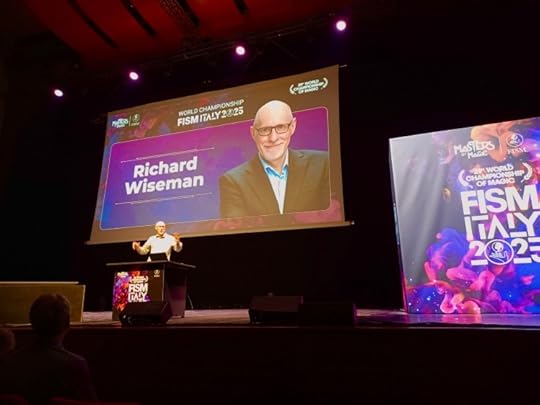Magic, Ego, and FISM

A few months ago, I was invited to present a series of events at FISM — often referred to as the Olympics of Magic. It’s a gathering of over 2,500 magicians from around the world, featuring days of intense magic competitions alongside workshops, lectures, and performances. This year, the event was organised by my friend Walter Rolfo, who kindly asked me to deliver a lecture, interview several well-known performers — including quick-change artist Arturo Brachetti, Luis de Matos, Mac King, and Steven Frayne — and also stage my show Experimental.

It was an incredible week. Magic is a small, strange, and tightly-knit community, and it was a joy to reconnect with people I hadn’t seen in years. One highlight was a great workshop on acting and magic by actor Steve Valentine. Steve and I first crossed paths back in 1983 when we were both competing in The Magic Circle’s Young Magician of the Year. Neither of us won; that honour (quite rightly) went to Richard Cadell—now a regular performer alongside Sooty and Sweep.
My show Experimental is somewhat unusual because there’s no performer. Instead, the audience takes part in a series of illusions and psychological experiments by following prompts on a large screen at the front of the room. Each show is different and shaped entirely by the people in the room. I sit quietly at the back, guiding the experience by choosing the order of the material.
The idea for Experimental came to me years ago, as I was thinking about why magicians perform. It struck me that if a performer genuinely wants to entertain their audience, their words and actions tend to come from a place of generosity. As I like to say, their feet will be pointing in the right direction and so any steps that they take will tend to be positive. But if they come on stage purely to feed their own ego, the audience take second place and the show usually suffers. Removing the performer entirely forced me to design an experience that prioritises the audience from start to finish.
After each performance at FISM, we held a Q&A with the audience. Time and again, I was reminded of something the legendary illusionist David Berglas once told me. One night we were flipping through an old photo album when we came across a picture of him, aged about eight, putting on some kind of show. I asked if it was his first performance. He paused and said, “No. That wasn’t a performance—that was me showing off.”

Curious, I asked him what the difference was. His answer has always stuck in my mind: “Performing is for the good of the audience. Showing off is for the good of the performer.”
I have always thought that there was an interesting life lesson there for everyone, and it was nice to spend many a happy hour chatting about the idea at the amazing and unique event that is FISM.
Richard Wiseman's Blog
- Richard Wiseman's profile
- 583 followers



